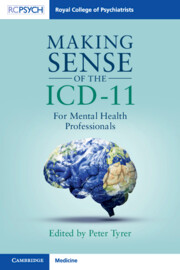Book contents
- Making Sense of the ICD-11
- Making Sense of the ICD-11
- Copyright page
- Contents
- Contributors
- Introduction
- Chapter 1 Development and Innovation in the ICD-11 Chapter on Mental, Behavioural and Neurodevelopmental Disorders
- Chapter 2 ICD-11 + DSM-5 = A Diagnostic Babel
- Chapter 3 Schizophrenia or Other Primary Psychotic Disorders
- Chapter 4 Mood Disorders
- Chapter 5 Disorders Specifically Associated with Stress
- Chapter 6 Disorders Due to Substance Use
- Chapter 7 Child and Adolescent Psychiatric Disorders
- Chapter 8 Anxiety and Fear-Related Disorders and Obsessive–Compulsive and Related Disorders
- Chapter 9 Personality Disorders
- Chapter 10 Disorders of Intellectual Development
- Chapter 11 Eating Disorders
- Chapter 12 Mental Health Classifications in Primary Care
- Index
- References
Chapter 10 - Disorders of Intellectual Development
Published online by Cambridge University Press: 13 October 2023
- Making Sense of the ICD-11
- Making Sense of the ICD-11
- Copyright page
- Contents
- Contributors
- Introduction
- Chapter 1 Development and Innovation in the ICD-11 Chapter on Mental, Behavioural and Neurodevelopmental Disorders
- Chapter 2 ICD-11 + DSM-5 = A Diagnostic Babel
- Chapter 3 Schizophrenia or Other Primary Psychotic Disorders
- Chapter 4 Mood Disorders
- Chapter 5 Disorders Specifically Associated with Stress
- Chapter 6 Disorders Due to Substance Use
- Chapter 7 Child and Adolescent Psychiatric Disorders
- Chapter 8 Anxiety and Fear-Related Disorders and Obsessive–Compulsive and Related Disorders
- Chapter 9 Personality Disorders
- Chapter 10 Disorders of Intellectual Development
- Chapter 11 Eating Disorders
- Chapter 12 Mental Health Classifications in Primary Care
- Index
- References
Summary
“Disorders of intellectual development” is an important name change from “mental retardation” which is now stigmatized. Inclusion in ICD-11 is important, as global statistical returns to WHO use ICD, giving focus on population needs. Essential features are: significant limitations in intellectual functioning, and adaptive behaviour functioning, with onset during the developmental period. Further specifiers delineate a mild, moderate, severe, profound, or provisional disorder. Co-morbidities are extremely common and complex; including other mental, behavioural, and neurodevelopmental disorders, sensory impairments, and, importantly, physical disorders (multi-morbidity is normal). Co-morbid disorders often present atypically, so assessment and treatments are more complex and need individualization to prevent poor care. Clinicians using the ICD-11 classification should also code aetiology of disorder (when known), additional mental, behavioural, and neurodevelopmental disorders, physical disorders, and sensory impairments. ICD-11’s hierarchical coding has changed from ICD-10, and differs from DSM-5, though descriptions are similar. ICD-11 provides tables on behavioural indicators of intellectual and adaptive functioning to aid diagnosis, as access to, and training in, existing scales is not currently universal. The optional specifier in ICD-10 on impairments in behaviour was removed from ICD-11 and no equivalent provided.
- Type
- Chapter
- Information
- Making Sense of the ICD-11For Mental Health Professionals, pp. 122 - 134Publisher: Cambridge University PressPrint publication year: 2023

